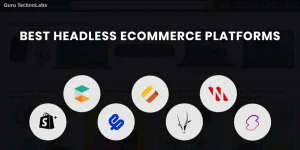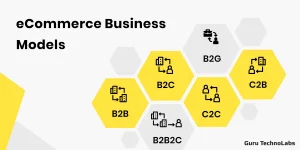11 Best eCommerce Platforms to Supercharge Your Online Business in 2026
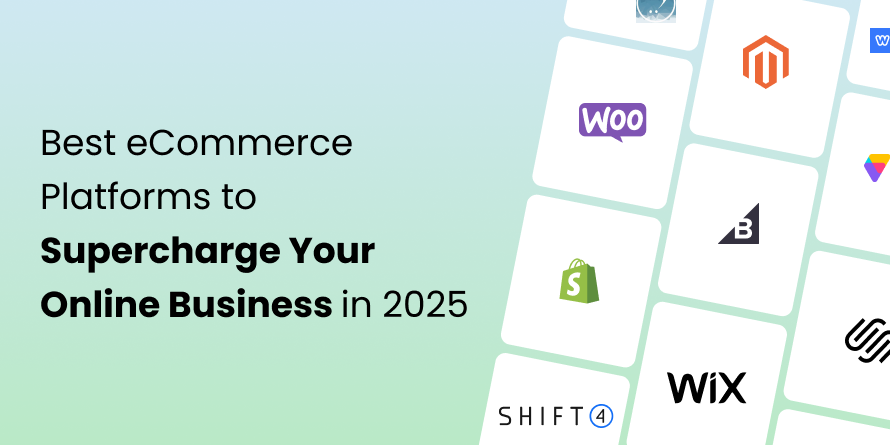
Stop selling harder; sell smarter.
eCommerce is booming. 2024 is about to end, and the competition in eCommerce is cut-throat. People are moving away from mom-and-pop stores due to the growth of online shopping and ordering platforms.
By 2026, eCommerce will account for 21.9% of global retail sales, surpassing $7528 billion.
From the above statistics, selling online has become a trend among retailers, allowing them to grow without any geolocation limit. But with so much potential- it has become inevitable to lay down the proper foundation – the decision to pick the best eCommerce platform. This decision alone can either make or break your online business.
From free options like WordPress to premium platforms like Shopify, there are plenty of choices; each comes with a unique set of features and costing structure.
- So, how to choose the best eCommerce platform?
- Which platform costs less and comes with lots of modern features?
- Will this platform allow me to scale in the future?
- Does this platform offer dedicated support?
We know abundant questions pop up in your head when it comes to choosing the right eCommerce platforms. To make an informed decision, we will review the top eCommerce platforms in 2026 and share their pros, cons, costs, and more.
What is an eCommerce Platform?
An eCommerce platform is a software application where both parties, the seller and consumer, come and play their roles. Everything you need is already integrated into an eCommerce platform, including a design, the ability to process and manage inventory, process payments, product information, customer details, and sales details – all in one platform.
Some platforms are built for large enterprise eCommerce merchants with more complex feature integration and more development resources for customization. Having an eCommerce platform means establishing a virtual storefront where potential customers can surf your products, place an order, and even interact with live chat agents.
These various business models of eCommerce can operate in an environment called an eCommerce platform. In particular, it offers multiple capabilities to help organizations manage their operations, digital sales, omnichannel marketing, and virtual assets.
Market Share Of Top eCommerce Platforms
Global sales of eCommerce platforms and software are anticipated to reach USD 17,074.1 million by 2034, from USD 4,679.8 million in 2024. During the projected period from 2024 to 2034, sales are expected to increase at a CAGR of 13.8%.
In 2023, eCommerce platforms and software generated USD 4,112.3 million in revenue. In 2026, the industry is expected to rise 13.6% yearly.
| Particulars | Key Insights |
|---|---|
| Estimated Size, 2026 | USD 4,679.8 million |
| Projected Size, 2034 | USD 17,074.1 million |
| CAGR (2024 -2034) | 13.7% |
Thanks to eCommerce platforms and technologies, businesses can more successfully offer their goods and services. These platforms and software have an extensive feature set. These characteristics are crucial for customer relationship management, product management, payment processing, and storefront design. Online store creation, management, and enhancement all benefit from these platforms.
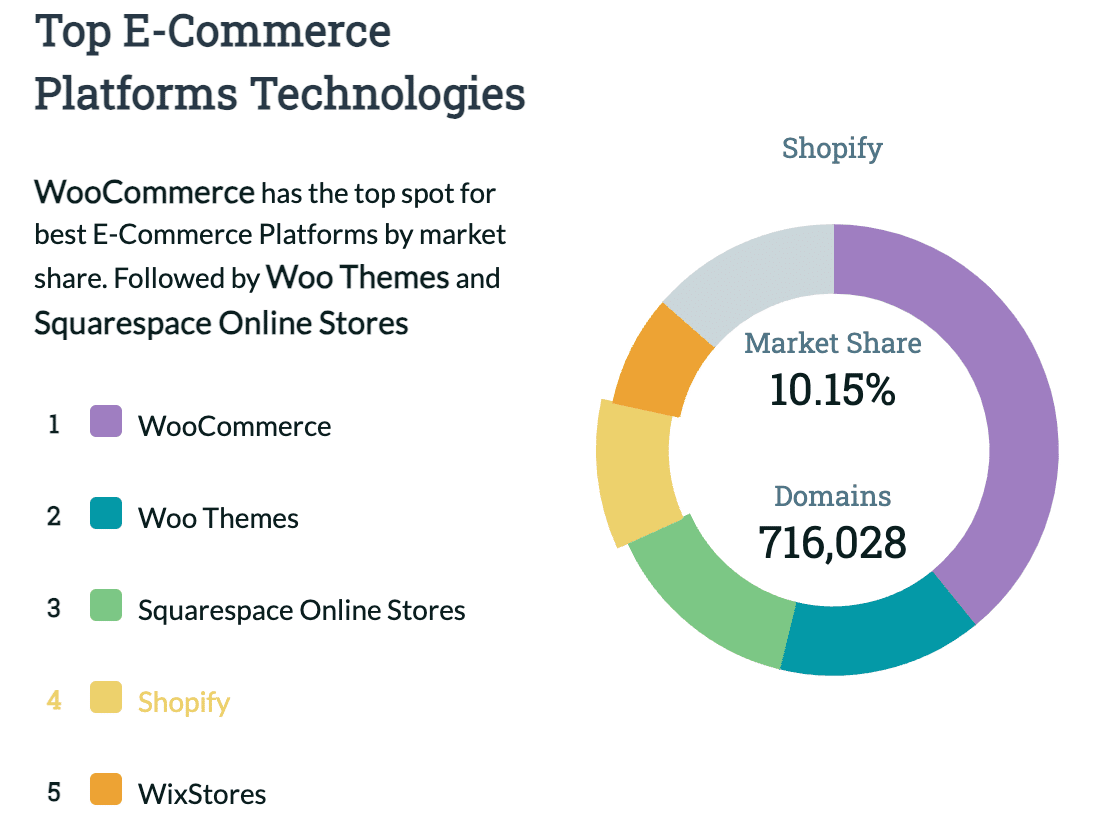
(Source: Colorlib)
Since digital transformation is becoming more widely accepted, eCommerce platforms may reach a wider audience. This is particularly crucial given that a sizable portion of the populace uses digital wallets and other such substitutes for traditional banking services.
eCommerce platforms and software can leverage the increasing popularity of digital tools and technologies to reach new markets, enhance financial inclusion, and support the global growth of the digital commerce industry.
To stay competitive in such a rapidly growing industry, it’s essential to keep up with the latest ecommerce trends, which can help inform your choice of platforms and strategies.
11 Best eCommerce Platforms For Your Online Business In 2026
Small to large enterprises are aware of popular eCommerce platforms such as WordPress, Shopify, Showare, etc., although you might have to pay more.
But what are the other eight players?
We have compiled the following list of the best eCommerce platforms for successful online business. Sit, relax, and choose the one that suits your business.
1. Shopify
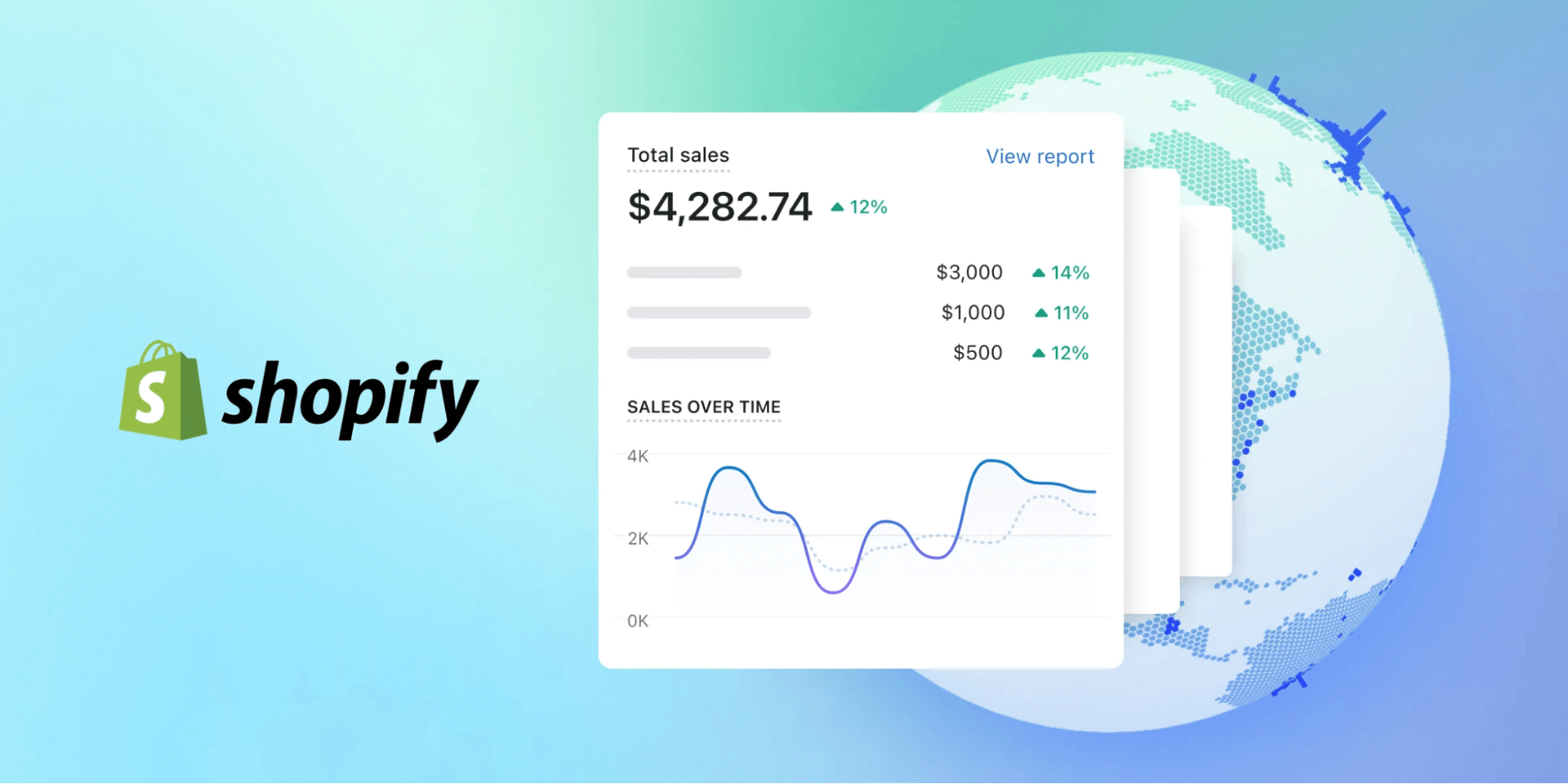
You can create an online store using Shopify, an eCommerce platform. It enables you to sell in-person via a point-of-sale app or online using your website. Whether you’re a high-growth D2C business or a novice drop shipper, Shopify is simple.
A specialized eCommerce website builder, Shopify assists users in creating their online store. With the most significant market share of 38.2%, it is also the most popular eCommerce platform worldwide.
To make your dream a reality in Shopify development, you only need to hire a Shopify expert with strong technical skills and experience. With over 8,000 apps, Shopify is a robust platform that anyone can use as it is highly scalable and robust.
Shopify has three pricing plans:
- Basic plan: $29/month
- Standard plan: $79/month
- Advanced plan: $299/month
2. WooCommerce
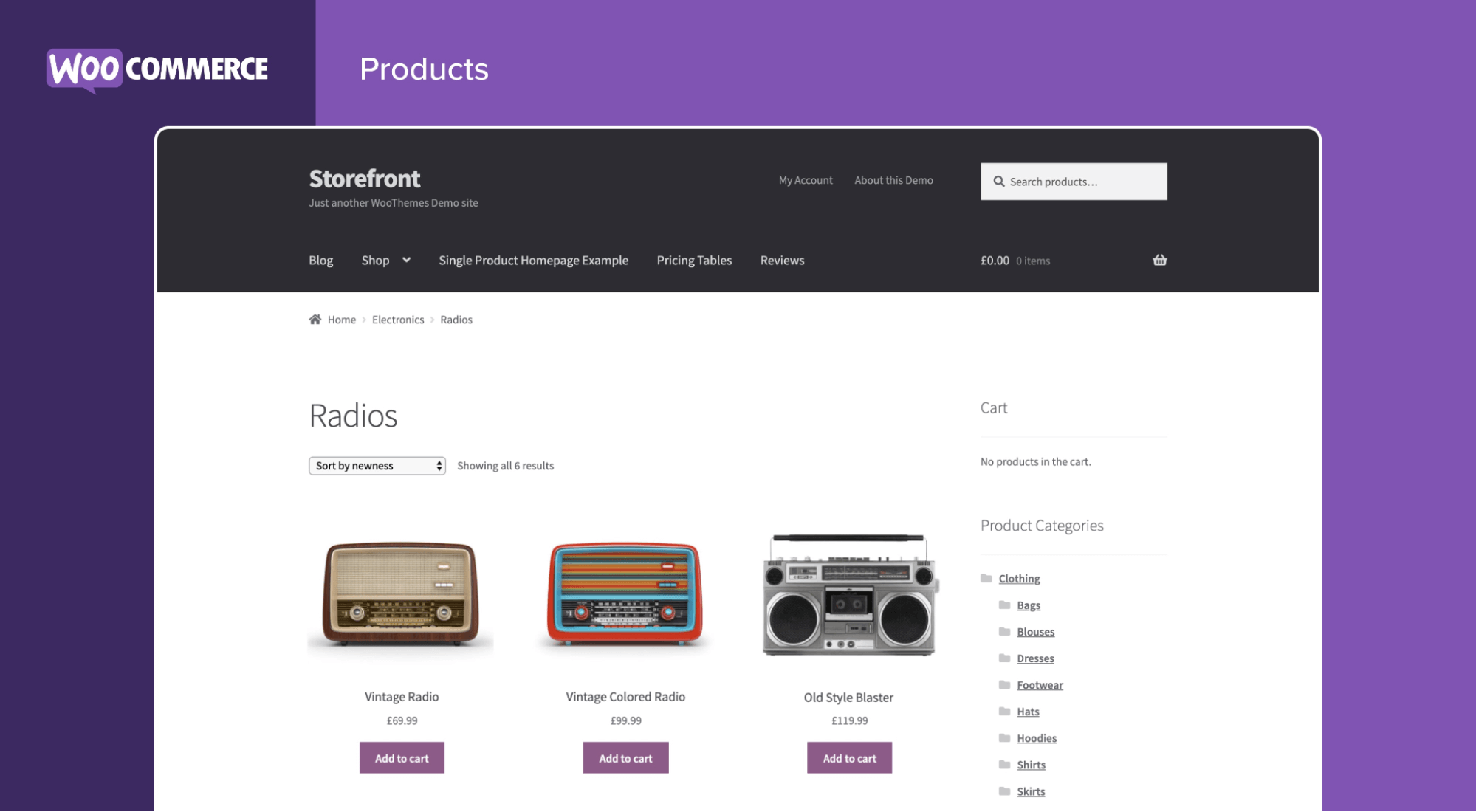
WooCommerce is a popular, accessible, and open-source plugin for WordPress. With millions of small and large online stores using it, it has become the most popular eCommerce platform globally.
Automattic, the firm that created WordPress.com, owns WooCommerce, which was introduced in 2011. WooCommerce makes the direct creation and management of online stores from WordPress websites possible.
WooCommerce allows users to sell both digital and physical goods. You can process payments using many different payment methods, as well as manage shipping and inventory.
While WooCommerce is free to install, business owners must consider additional expenses such as domain name, hosting, and customization. Understanding the WooCommerce development cost is crucial for planning an optimized and scalable eCommerce store.
Pricing: The platform is free, but business owners must pay for the domain name and hosting.
3. BigCommerce

Out of many eCommerce platforms, BigCommerce is the most potent and most-used platform that allows all-scale businesses to develop and manage their online stores. Yes, you are going in the right direction. Why?
There are many other platforms in the market, so why BigCommerce?
Around 17.5% of stores moved from WooCommerce to BigCommerce.
Because BigCommerce comes with certain benefits for online business owners. From the platform’s user-friendliness to customization options, scalable features, and dedicated customer support, this platform is a better choice among budding entrepreneurs.
More and more store owners are getting attracted to these advantages and are becoming interested in the exciting growth of this eCommerce platform.
BigCommerce is keeping up with new eCommerce trends by providing features that meet the current needs of online shoppers.
Pricing:
- Free 15-day trial available.
- Paid plans start at $29/month.
4. Magento eCommerce
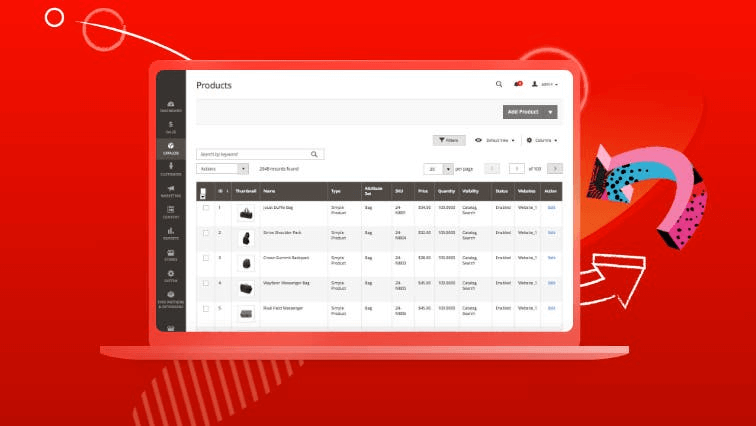
As per the recent report posted by Built With Trend, more than 130,000 websites have been built with Magento, and it is one of the best eCommerce platforms that allow entrepreneurs to set up stores. These numbers reflect Magento’s position in the eCommerce market.
Magento is a popular eCommerce platform where retailers can develop and build online stores and deliver a top-notch user experience to their customers. Magento works similarly to WooCommerce, BigCommerce, and Shopify.
Up to this time, there are thousands of stores using this open-source platform to launch their online store. Famous names such as Nike, Samsung, etc., use this platform to build “monumental” stores for their businesses.
Pricing: The Magento Open Source software is free to install. However, getting it up and running incurs expenditures across all three segments: infrastructure, development, and support and maintenance.
A merchant must bear the hosting, domain, SSL certificate, design, customizations, integrations, support, and maintenance costs while using Magento Open Source.
5. Squarespace

Squarespace is one of the most inventive eCommerce platforms. Squarespace is an excellent online store builder, boasting slick layouts and competent editing capabilities.
Squarespace for eCommerce offers consumers a professional-level design interface that elevates and distinguishes their online sites. A Squarespace web store is sleek and one of the most popular platforms among business owners.
Many eCommerce professionals favor Squarespace’s professional design and current designs. Currently, Squarespace hosts about 100,000 online stores. Many Squarespace web storefronts demonstrate how widespread the platform is among eCommerce business owners.
Pricing:
- Cheapest plan: £12/month
- Most expensive plan: £35/month
Custom eCommerce Development Services to Take Your Online Stores to New Horizon of Success.
6. Wix

Wix is a super popular eCommerce platform for building websites and online stores. With over 230 million users and thousands of employees, Wix is a dedicated builder and platform that allows store owners to quickly engage and stay updated with their sites on the go.
Wix offers appealing templates for all domains, including small businesses, restaurants, online stores, musicians, and photographers. The platform boasts more than 900+ free templates that can be customized per your requirements. Moreover, all these templates are mobile responsive and have many features that can be modified per your needs.
Pricing:
- Free for basic use
- Paid plans start at $17/month (ideal for small businesses)
- Advanced plans at $36/month for features like automated tax calculations
7. Shift4Shop

Shift4Shop is a comprehensive eCommerce platform that serves the needs of business owners looking to launch and grow their businesses online. It provides a free solution with robust capabilities to simplify the eCommerce process, enabling companies to easily build aesthetically pleasing online stores without technical knowledge.
Apart from the website builder, Shift4Shop has firm order and product administration capabilities. Companies may use the platform to efficiently run their online businesses by easily managing their inventory, tracking orders, processing payments, and handling shipping and fulfillment.
Pricing: With Shift4Shop’s particular price structure, the platform is free if you process more than $500 a month. Otherwise, it offers tiers of pricing according to the size and features of the company.
8. Volusion
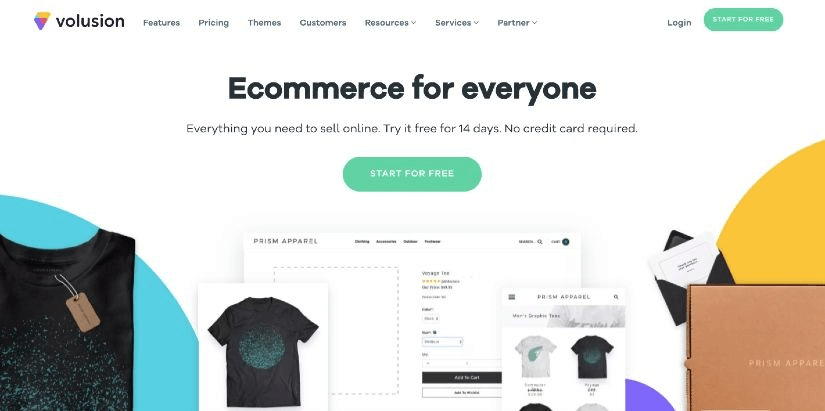
Volusion is one of the oldest eCommerce platforms, launched in 1999. It helps small businesses to take their operations online. Another well-known aspect of Volusion is its security features, particularly its secure checkout. The “Drag and Drop Builder” in Volusion is the one feature that everyone loves. Drag and drop makes it easy to edit and modify your page.
The Automatic Tax Calculator is one function that can be the most helpful to you. Tax management may be the most challenging aspect of operating a corporation. Volusion’s Automatic Tax Calculator helps to alleviate this discomfort. In addition, Volusion provides social network integrations, SKU import/export, abandoned cart reports, and free and premium themes.
Pricing:
- $29/month for Personal plans
- $79/month for Professional plans
- $299/month for Business plans
9. OpenCart

OpenCart is one of the best open-source eCommerce platforms, which means you can download it and upgrade it free of cost anytime. It utilizes a variety of HTML elements and is built on the PHP and MVC framework, running on a MySQL or PostgreSQL database.
Additionally, there are no monthly fees associated with using OpenCart. You can manage customers, items, coupon coupons, tax regulations, orders, and more with its built-in SEO, according to its complete shop management qualities.
Additionally, OpenCart lets you choose outstanding themes and modules to increase the functionality of your online business. Additionally, OpenCart users receive free or specialized commercial community support.
Pricing: No monthly fees
10. Weebly

Established in 2006 and acquired by Square in 2018, Weebly has become one of the most popular website builders, with over 50 million users globally. Weebly’s user-friendly design, extensive feature set, and reasonable prices have made it easy for companies, individuals, and organizations to quickly and easily construct websites that appear professional.
Weebly also offers a comprehensive help area with lessons and tips that assist customers in creating a website of professional quality at every stage. One of Weebly’s best features is its general ease of use, making it a desirable option for anyone wishing to create a website quickly and without any technical difficulties.
Pricing:
- Free plan available for evaluation.
- Paid plan (“Connect Plan”) starts at $5/month.
11. Ecwid
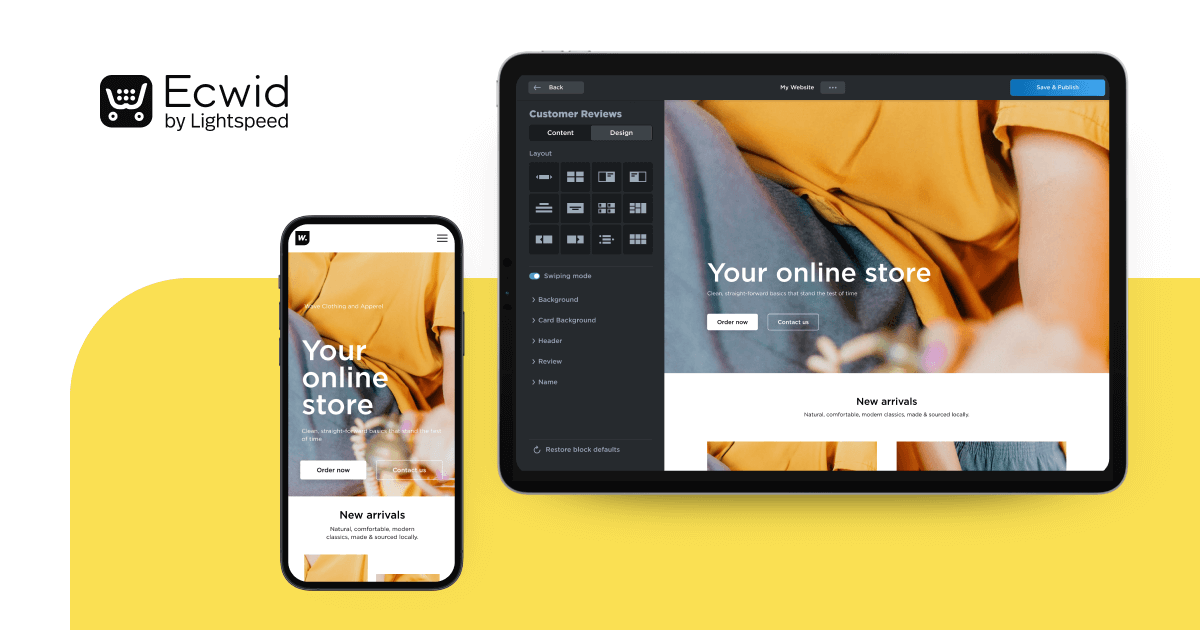
The eCommerce platform Ecwid aims to sell your products in as many marketplaces as possible. You can use the service to construct an online storefront and use plug-ins to embed it on other platforms.
Established in 2009, Ecwid powers over 897,000 online stores after being purchased by eCommerce and point-of-sale firm Lightspeed in 2021.
In terms of duration, this indicates that Ecwid is a relatively secure choice; it is unlikely to go out of business anytime soon. Ecwid lets you create "catalogs" of products and add details like weight, price, and images for each one, just like rival e-commerce platforms.
Sellers can also define shipping rates, accept payments through credit cards, and offer all the features you can expect from any eCommerce solution. The beauty of this platform is that everything can be done in a web browser, and you don’t need to install anything.
Pricing:
- Free plan available with limited features.
- Paid plans start at $21/month.
Types of eCommerce Platforms
When launching an online business, the choice of the best eCommerce platform will have much to do with whether or not that business takes off. Below, we break down the most popular types of eCommerce platforms to help you make informed business decisions.
1. Hosted eCommerce Platforms
Hosted platforms like Shopify and BigCommerce offer all-in-one solutions – hosting, security, and software updates. These platforms are great for beginners or businesses seeking a simple, low-headache setup.
2. Self-hosted eCommerce Platforms
Self-hosted eCommerce platforms, like WooCommerce or Magento, allow you complete control over your online store, from design to functionality and hosting. While installation requires more technical knowledge and effort, these platforms offer flexibility and scalability, suitable for businesses that want to customize their site.
3. Marketplace eCommerce Platforms
Marketplace eCommerce platforms like Amazon, eBay, and Etsy make it easy for businesses to list their products on a shared site with built-in customer traffic. They have an enormous following, and they tend to be very user-friendly, however, they do free charges and typically control branding and interactions with the customers.
4. Open-source eCommerce Platforms
Since both PrestaShop and OpenCart are open-source platforms, they are free and easy to modify. Because the code of an open-source platform is open for alterations, you can make and customize it according to your needs.
5. Subscription-Based eCommerce Platforms
These platforms, like Cratejoy and Subbly, are made specifically for businesses selling subscription-based services or products. They come with recurring billing, customer engagement, and subscription analytics features.
6. Social Commerce Platforms
Another way of selling its products is to customers through social commerce platforms, such as Facebook Shop and Instagram Shopping. This facility is beneficial to brands with large followings on social media where it can sell to customers online.
7. Headless Commerce
Last, Headless eCommerce is a modern eCommerce approach where the front end is separated from the back end. With headless platforms, businesses can create a customized and highly flexible browsing experience across multiple channels, such as websites, apps, and even voice assistants.
Also Read: Best Headless eCommerce Platforms
Choose the Best eCommerce Platform for Your Business
Get expert advice to select the ideal eCommerce platform and scale
your business effectively. Book your free consultation now!
Turbocharge Your eCommerce Business Growth with Guru TechnoLabs
eCommerce platforms are essential in launching online business and making it accessible to your target audience. When it comes down to it, there is no one-size-fits-all platform, only the solution that is most suited to your online business.
Every business has various goals for eCommerce functionality, such as more payment methods, dropshipping capabilities, real-time inventory management, or an easy-to-use interface. Thus, the “best” platform for you will be the one that suits your requirements.
Once you have decided, develop an eCommerce business plan and launch an eCommerce strategy. It is essential to learn how to start your own eCommerce business. This is where the excitement begins because this is what will make your eCommerce idea a reality. Keep the enthusiasm because once you’ve decided on an eCommerce platform, you’re one step closer to increasing sales and expanding your online business.
Choose not just the right platform or design but choose Guru TechnoLabs because our competency lies in eCommerce website development and eCommerce app development, and we are always committed to adding more excellent value to our clients’ success.
Contact us today and enter the lucrative eCommerce world with a scalable platform.
Frequently Asked Questions
An eCommerce platform is a plugin or software that allows merchants to build and launch online stores while managing their customers, products, catalogs, payments and much more in a virtual environment.
The amount of time it takes to launch an eCommerce website depends on the complexity of your project. If you want to add more features and functionalities, it takes more time, and if you opt for less customisation, the launch time can be reduced.
No. Amazon is the largest online marketplace used by individuals and businesses. One can set up an online store and run a business with any eCommerce platform, while Amazon just allows companies to sell their products and services.
Shopify and WooCommerce are popular among the startup fraternity due to their robustness and scalability.
Profitability depends on various factors, but niches such as luxury fashion, pet products, and health supplements are known to be the most profitable for eCommerce businesses, with high demand and offering attractive yields on investments.



